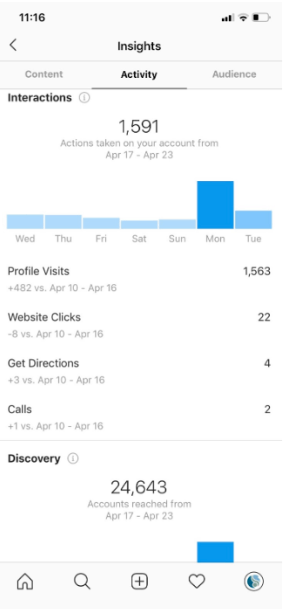Increasing Instagram engagement takes time and it takes effort. After all, it’s just not realistic for brands to expect instant Instagram success à la Jennifer Aniston. One million followers in five hours and 16 minutes? Record-setting.
In this article, you’ll learn what Instagram engagement means, different ways of measuring your engagement rate on Instagram, and 15 simple things you can do to increase your brand’s Instagram engagement.
And we’re talking real, genuine ways of increasing engagement. You’re not going to learn how to cut corners with Instagram automation. (We’ve already tried that so you don’t have to.)
You’re not getting a step-by-step guide to joining an Instagram pod. (There are better ways than turning to Instagram engagement groups. Promise!)
And you’re definitely not going to learn about buying likes or followers. (Don’t do it. Just, don’t.)
Keep reading for effective tips and tricks that will have long-term results for your brand’s Instagram presence and reach.
What does Instagram engagement mean?
Instagram engagement is how the public interacts with the content you publish. Calculating your Instagram engagement rate measures how well your brand is connecting with its audience.
But Instagram’s algorithm is always changing. And that means your brand’s Instagram engagement rate will likely fluctuate, too.
It’s also about more than just getting likes. Back in April 2019, Instagram began hiding the number of likes a post received for its Canadian users. By November 2019, Instagram began hiding likes worldwide.
Why? According to a January New York Times article, the CEO of Instagram, Adam Mosseri, was concerned about the effects likes had on users. He kept thinking about this episode of Black Mirror. Hiding likes seemed like the best thing to do to keep the platform safe.
That means brands shouldn’t only consider the number of likes a post gets when measuring Instagram engagement.
When using Instagram for business, keep track of various metrics using tools like Instagram Insights.
Here are a few useful metrics your brand can analyze to measure engagement rate on Instagram:
- Impressions
The total number of times all your Instagram posts and your Stories are seen. - Reach
The number of unique views your posts and Stories have. - Website clicks
The number of times the website link in your Instagram account is clicked, causing a user to leave Instagram and visit your website. - Profile visits
The number of times a user visited your Instagram profile. - Followers
Calculate your follower growth rate by dividing the number of followers you’ve gained in a specific time period by the previous number of followers. Multiply that by 100 for the percentage.
Other metrics to consider:
- Comments
The number of times users have written something underneath your post, including when they tag a friend. Add the number of comments with likes and saved posts to find the total interactions on a post. - Saved posts
The number of times users have clicked on the flag icon at the right-hand side of your post to add to their private collection of saved posts. They will probably return to your post to review later or view it repeatedly. - Views
The total number of times your video or Instagram Story was viewed. - Likes
The number of times users have clicked on the heart underneath your post. Even with likes being hidden, remember: Likes still matter.
Want to know how to measure engagement for other social media platforms? We show you how to measure social engagement for Facebook, Twitter, Snapchat here.
How do I calculate my brand’s Instagram engagement rate?
Unfortunately there’s not just one way to do it.
How you choose to calculate Instagram engagement rate depends on your brand’s goals and objectives.
Make sure you can access the data
You need to use analytics tools to access accurate Instagram metrics. And there are a variety of Instagram analytics tools available, including:
By the way, want a video that walks you through Instagram Insights? We can help:
Do some math
There are different ways of measuring your Instagram engagement rate. But no matter which way you choose, it’s going to involve doing a little bit of math to measure how users interact with your content.
Here, we clearly outline six ways to calculate Instagram engagement rate, including:
- Engagement rate by reach
- Engagement rate by impressions
- Daily engagement rate
Keep these formulas handy for when it comes time to write that monthly Instagram engagement report!
15 tips for increasing Instagram engagement
Once you’ve set up an Instagram business account, it’s time to get to work.
Know your audience
Track your audience metrics using Instagram Insights.
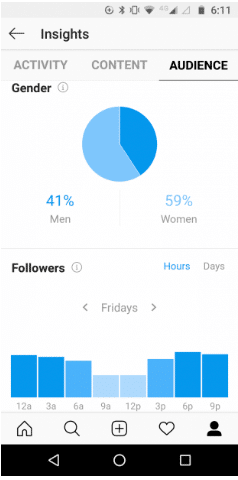
Under the “Audience” tab in Instagram Insights, you’ll find data about your followers. This helps you better understand who they are so you can create content that’s relevant to them.
Keep track of time
When it comes to timing, you want to make sure your followers see your posts. With Instagram Insights, you’ll see when your followers are online. The data shows which day of the week most of your followers are on Instagram and the time of day your followers are on the platform.
This will help you schedule your content at peak times. For example, if your data shows your audience is rarely on Instagram on a Monday morning, wait to schedule your content for a day and time when your audience is online.
And yes, there are optimum times to post on Instagram. Always keep track of your brand’s own metrics, but here we dig into the best and worst times to post on Instagram.
Make sure you post often — but not too often
One of the factors Instagram’s algorithm considers is recency. That means new posts are more likely to show in your followers’ feeds.
Your posts should be scheduled for when your audience is most likely to be online.That means they are more likely to see your content and are more likely to engage with it!
Consistent posting is key. But you don’t want to overwhelm them with content either. Try creating a content calendar to keep track of when and what you’re posting on Instagram. That way, you can make sure you’re not under-posting or over-posting.
For context, our Digital 2020 report shows that, on average, business accounts post content to their Instagram feeds 1.7 times per day. That means just over 7 posts a week.
Engage with your followers
It’s called social media for a reason. Be social!
Instagram is a platform for you to talk to your followers, for your followers to talk to you, and for you to engage with other users and brands. Respond to your followers’ direct messages. Reply to their questions or comments underneath your posts.
When you engage in the conversation on Instagram, this helps you understand your followers, how they connect with your brand, and what they’re saying about your brand.
Don’t forget about your caption
There are many ways to write a great Instagram caption to drive engagement.
You have 2,200 characters. That includes emojis and hashtags. That’s ample space to tell a story, write something thought-provoking, ask your followers a question, spend some time showcasing your brand’s voice, or provide some context for the image you’re posting.
View this post on Instagram
Photos by @PaulNicklen // New research from our collaborators at @oceansinitiative reveals that Arctic cod, a key species in Arctic marine ecosystems, have shown dramatic behavior responses to underwater noise caused by shipping traffic. This new research comes at a critical time. Shipping companies are eyeing new routes as sea ice cover in the Arctic continues to dissipate from climate change. Not only does this research show how shipping noise can impact the behavior of cod, but it also shows the potential impact of their altered distribution on the movements of their predators, which include narwhals, belugas, and ringed seals. With time, this could also touch Indigenous communities that depend on marine mammals for subsistence hunting. Tap through to our stories to learn more and follow @oceansinitiative for more information about this recent study with their colleagues @uwindsor, @pewenvironment, @dalhousieu, and @shedd_aquarium.⠀
SeaLegacy, an environmental non-profit, uses long-form captions effectively. Often, their captions include details on animal behaviour or scientific research.
Try a short caption
A 2,200-character caption isn’t always needed. Sometimes, less is more.
There are plenty of other ways to write a short yet engaging caption. For example:
- Pose an open-ended question for followers to answer in the comments.
- Encourage calls-to-action by suggesting followers tag a friend or vote on a multiple choice question.
- Encourage followers to click the link in your profile bio.
- Trade words for emojis.
- Launch a contest or giveaway.
Starbucks sticks to writing short, snappy captions that incorporate emojis.
Tag other Instagram users
Think your Instagram post will be of interest to other brands or to Instagram influencers? Want to get the attention of someone you admire? Hope to thank a celebrity or influencer who is working with your brand? Tag them in your caption.
This shows you value that person, but it also increases the chance of that user’s following of seeing your post. Because they can easily share it to their Story. And that increases your Instagram engagement!
The clothing brand Aerie uses celebrities, like Olympic gymnast Aly Raisman, to promote its clothing and its corporate values. The brand always tags those individuals in its captions.
Geotag your posts
Geotagging creates a sense of community among Instagram users who visit your brick-and mortar location and post photos when visiting.
Or, it showcases which great places your brand visits to get its photos.
Either way, it helps new users find you and engage with you. When you geotag your location, your photo will show up in the “Places” tab in Instagram’s Search and Explore section, along with all the other posts tagged to the same location.
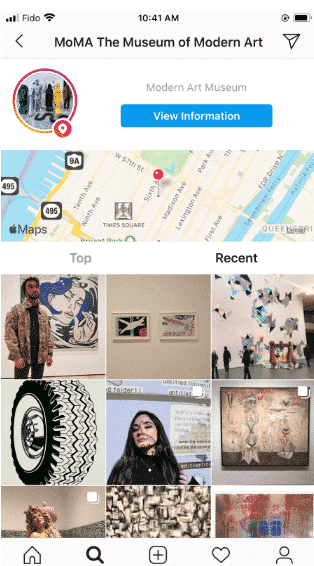
Keep up with what’s trending on Instagram
In December, the 10 Year Challenge took over Instagram. Users posted changes from the end of 2009 to the end of 2019. (There’s over 4 million posts with the hashtag #10yearchallenge.) And of course, who can forget all the Baby Yoda memes in November 2019.
Another example? The Dolly Parton Challenge.
Brands like Dunkin’ Donuts and MCDonald’s both got involved in the Dolly Parton Challenge in January.
If it’s right for your brand, staying up-to-date with social media trends and pop culture news shows that your brand knows what’s happening and popular on the platform. It’s also a way to showcase your brand’s playful side.
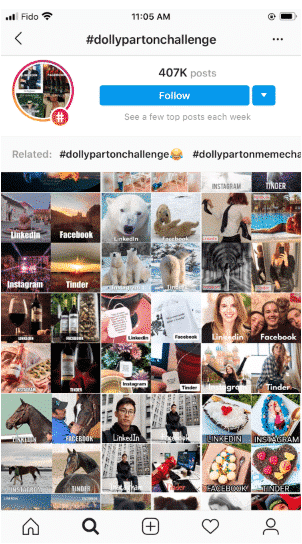
You might even have fun taking part in the trend. At least 407,000 accounts did for the Dolly Parton Challenge! Many of them were businesses.
Share beautiful photos to stop thumbs
Great photos still matter. A lot. But you don’t have to spend tons of time to make your photos Instagram-quality.
Take a quality photograph, then edit that Instagram photo like a professional photographer.
The result is a consistent brand aesthetic and eye-popping photos that your followers can’t help but engage with.’=
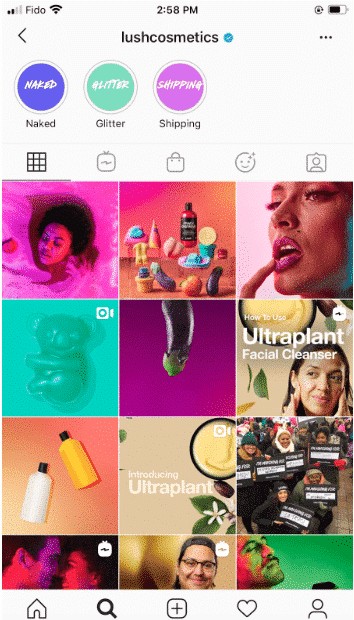
Lush is just one example of a brand whose photos are edited for consistency. Their bold colors stick out in the feed.
Or go the authenticity route
That being said, you might not want your Instagram posts to be picture-perfect. Genuine, authentic posts without filters can also be appealing to your audience depending on your brand’s goals.
Consider content by brands and influencers that are connecting with their audiences by celebrating normalcy or touching on vulnerabilities, like:
Lululemon
In the summer of 2019, Lululemon interviewed seven women who shared real, personal stories for its Boob Truth Tuesdays series.
Dove
Dove’s Real Beauty campaign and Self-Esteem Project mean the brand frequently posts real and diverse images.
Sarah Nicole Landry
In her posts on @thebirdspapaya, Landry celebrates body positivity and personal experiences.
Don’t be afraid to get creative
Your brand doesn’t have to stick to the same type of content all the time. In fact, diversifying content you post on Instagram and adding a little creative flair can help your engagement rate.
In particular, creating content that users can save and come back to later (like a recipe) or visit time and time again (like an instructional workout video) will lead to an increased engagement rate on Instagram.
Try out new post types, like:
Numbered lists and checklists
Infographics or interesting data
Quotes from an article
Behind-the-scenes pictures and video
Workout ideas and tutorials
View this post on Instagram
You made it to the FINAL week of our 2020 #NewYearsChallenge. So let’s work those glutes, shall we? Do each move above for 40 seconds, resting 20 seconds between moves. After your last move, rest for 60 seconds. That’s 1 circuit. Do the entire circuit 3-5 times. After your last circuit, try the AMRAP…which you can only find by clicking the link in our bio. ???? Let’s go, #TeamSELF! ⠀⠀⠀⠀⠀⠀⠀⠀⠀⠀⠀⠀⠀⠀⠀⠀⠀⠀ ????: @kkatiethompson, modeled by @deuuuce_, wearing an @alala bra, @puma leggings, and @nike sneakers
Need more Instagram post ideas? We can help you out.
Incorporate video into your Instagram strategy
Videos can be three to 60 seconds long on Instagram, meaning there’s the potential for your brand to engage with followers for an entire minute.
(If you want to post longer video, share a preview to your feed and then post the long-form video, which can be up to 10 minutes long, to Instagram TV.)
Need ideas? Recent Instagram statistics show that the platform’s most popular video content includes how-to tutorials, followed by behind-the-scenes video, interviews, and news.
Don’t be afraid to cross-promote content across your social channels. For example, let your users know via Twitter that you have a new video on Instagram. Or share snippets of your popular YouTube videos on Instagram, like Bon Appetit does with its Gourmet Makes videos.
Make the most of Instagram Stories
The data shows Stories are useful for brands’ Instagram engagement.
On average, brands post 2.5 Instagram Stories each week. More than 30% of Instagram’s most-viewed Stories are from businesses. Plus, brands’ Stories have an 85% completion rate.
Using stickers or other interactive features increases Stories’ potential for engagement. Features like polling, question-and-answer boxes, quizzes, and countdown tickers can all be added to your Stories. You can even try creating your own Instagram AR filter.
Here, Speedo uses Instagram Stories to connect its followers with product reviews.
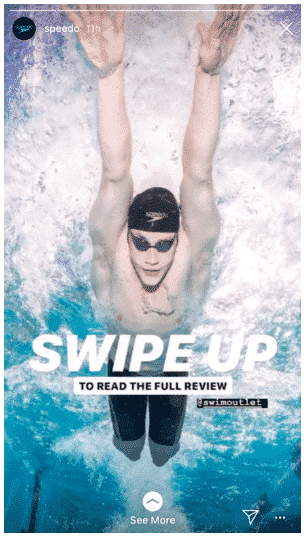
Use hashtags — in your posts and your Instagram Stories
Hashtags help users find your content, since your posts with hashtags will show in the “Tag” section of Instagram’s Search and Explore. And no one can engage with your post if they can’t find it.
Remember to choose your hashtags carefully. Research popular Instagram hashtags, track which are trending in your industry, and monitor what tags your competitors are using.
Creating a unique, branded hashtag can also increase engagement. This makes it easy to collect photos if you’re planning on a competition, giveaway or campaign that centres on user-generated content.
Think of National Geographic’s #yourshotphotographer which is used for members of the public to get their own photo onto the National Geographic Your Shot page:
Increasing your Instagram engagement takes time and it takes work. It requires analysis of your Instagram metrics, calculating your Instagram engagement rate and some creativity on the platform itself.
But by following these simple tips, your brand will see a boost in its engagement!
Save time managing your Instagram presence using Hootsuite. From a single dashboard you can schedule and publish posts directly to Instagram, engage the audience, measure performance, and run all your other social media profiles. Try it free today.
Get Started
